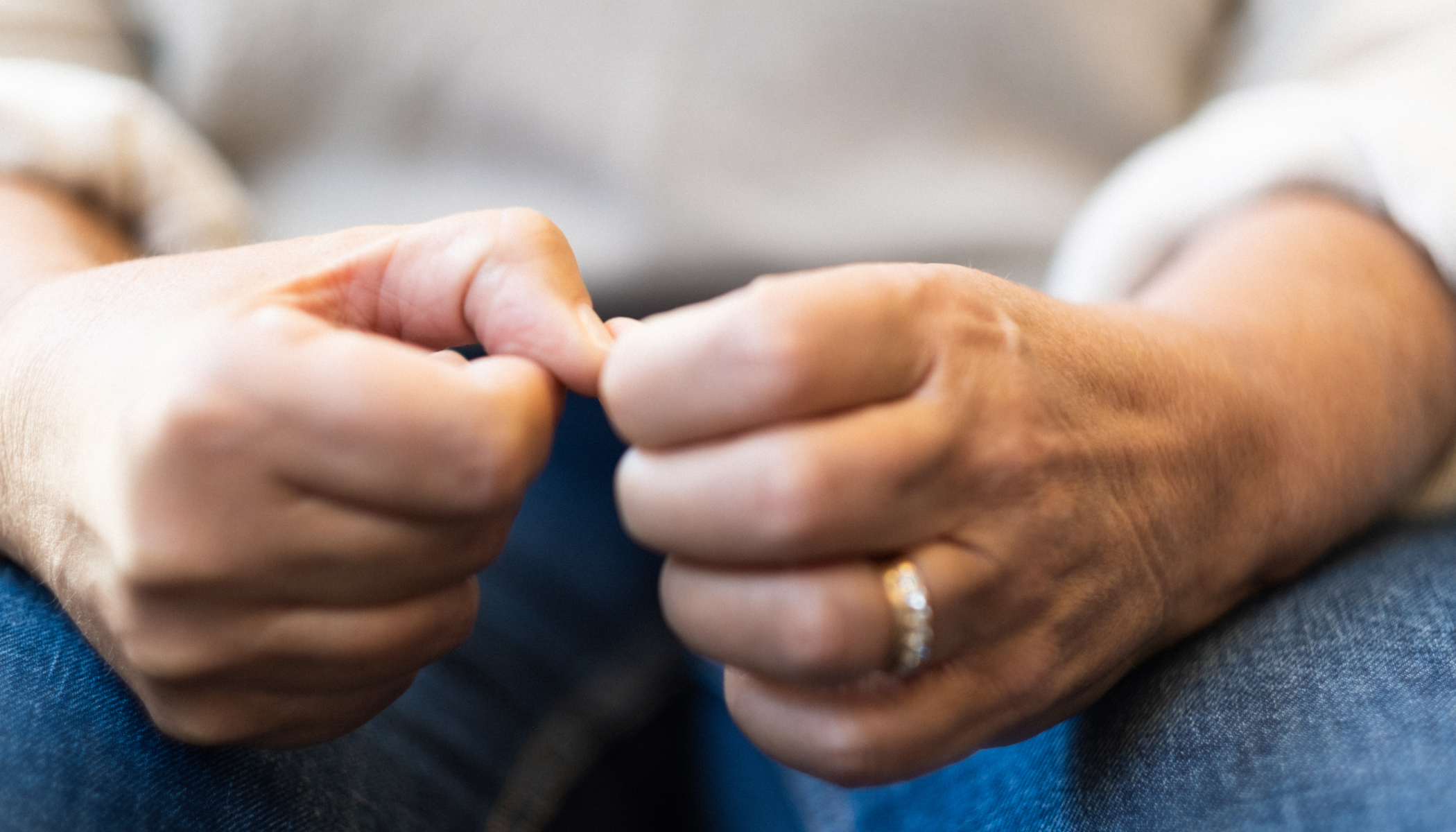Feeling the need to self-harm can affect anyone at any point in their lives – and sadly it may be more common than we think. Research shows that self-harming cases have tripled in the last 10 years.
Self-harm can be upsetting for the people around you because they might not understand it, and they may find it very painful to see physical evidence of your distress.
‘If you’re considering harming yourself, it’s important to remember it’s only a temporary way to cope,’ says Dr Oyefeso. ‘It can also bring up painful feelings and make things even worse.’
What is self-harm?
Self-harm is when you hurt yourself on purpose as a way to cope with difficult feelings or experiences.
There are lots of different ways people might hurt themselves including cutting, scratching, banging your head or burning your skin.
‘While self-harm can be noticeable on the skin, some people hurt themselves in less obvious ways, like through not eating, heavy drinking, getting into fights or drug use,’ Dr Oyefeso explains.
Why do people self-harm?
Everyone finds their own way to try and cope with life’s challenges. People have described self-harm as a way to:
- Have a sense of being in control
- Turn invisible emotions into something visible
- Have a short-term release from overwhelming thoughts or feelings
- Punish themselves for things they feel or have done
- Escape traumatic memories
- Make themselves ‘feel something’ rather than numbness
- Express suicidal thoughts without taking their own life
- Let other people know they need help
‘When someone harms themselves they may be feeling sad, guilty, hopeless or ashamed,’ says Dr Oyefeso. ‘Although there can be a link between suicidal thoughts and self-harm, most people who self-harm don’t want to die, but instead manage severe distress while living their life.’
Who is more likely to self-harm?
Self-harm can affect anyone, but certain people can be more vulnerable. Self-harm is more common in:
- Young people
- Girls and women
- People with a a mental health problem like depression, anxiety, borderline personality disorder or an eating disorder
- LGBTQIA+ people due to discrimination
- People who were abused as a child
- People who have lost someone through suicide
- People who are in prison
- Asylum seekers
- Veterans of the armed forces
How to stop self-harm when the urge arises
It may seem hard to see a way past urges to harm yourself, but there are ways you can help yourself and find professional support.
1. Understand why you self-harm
When you become familiar with your patterns of self-harm, you’ll know when the urge is coming on and ultimately be in a better position to stop it.
Learn to recognise your triggers – Note what you were thinking or feeling just before you hurt yourself. Did a certain situation, person or memory cause you to self-harm?
Take note of what the urge feels like – This might be a physical feeling like a racing heart or numbness, or an intense emotion like anger, sadness or despair.
Keep a diary – Write down what it feels like before, during and after you self-harm, how regularly you do it and when. You’ll see patterns if you keep this up for at least a month. It can be difficult to see your emotions and behaviour patterns on paper, so make time to take your mind off it after.
2. Try to distract yourself
‘Different distractions work for different people, so it’s good to try a few strategies,’ Dr Oyefeso says. ‘Especially if the thing that triggers you to self-harm tends to change.’
If you feel sad or fearful – Listen to soothing music, get cosy at home or try to sleep, go for a walk in nature, let a friend or relative know how you feel, or just let yourself cry.
If you feel angry – Try to channel your anger through hitting cushions, tearing up a piece of paper, or through exercise like running. Only continue with these distraction methods if you feel a positive effect, not if it makes the anger worse.
If you feel like you need to punish yourself – Do some exercise or find a creative way to express your self-hatred, like writing a poem or drawing. You can also try writing a letter to yourself from the part of you that feels you deserve to be punished, then write back as though you were a friend with compassion.
If you feel you need to be in control – Tidy your home, do some gardening, write lists or practice clenching your muscles and then releasing.
If you’re feeling disconnected – Try holding ice cubes, smelling something strong like garlic or onion or having a cold shower.
3. Delay self-harming
‘It isn’t always easy to fight the immediate urge to self-harm, but by waiting just 5 minutes, you may find the intense feelings have passed. You could even try sitting on your hands during this time,’ Dr Oyefeso recommends.
If delaying works well for you, try waiting a little longer each time and it may become easier to avoid hurting yourself altogether.
How to stop self-harm in the long-term
Overcoming self-harm completely can take a bit more work than helping yourself in the moment each time. It involves a deeper exploration of why you self-harm so you can find alternative ways to manage your thoughts and feelings. There are a number of ways you can help yourself in the long term.
1. Learn to accept your feelings
‘It can be scary to let yourself experience difficult feelings again, but it's a very brave thing to do,’ says Dr Oyefeso. You can try to:
- Keep a journal to prevent you being overwhelmed by your feelings
- Name feelings as you become aware of them
- Use online tools and worksheets to help you deal with feelings – Self-injury Support has some useful resources
- Work with a therapist who can help you validate and accept your feelings
2. Improve your self-esteem
Finding ways to look at yourself in a positive light is important to helping you overcome self-harm.
- Write down things you appreciate about yourself on a regular basis
- Try to think about yourself in the same way as you’d think of someone you love or admire
- Learn to be assertive by setting boundaries and expressing what does and doesn’t work for you in life
- Think in a more empowered way, for example, ‘Even though I’m hurting myself, I’m determined to make progress.’
3. Delve deeper into why you self-harm
‘The more you understand your relationship with self-harm and the role it plays in your life, the better equipped you’ll be to move on and find new ways to cope,’ Dr Oyefeso reassures. Ask yourself:
- What was the reason you first started to self-harm?
- What is self-harm to you? What role does it play?
- What situations make you likely to hurt yourself?
- What worries you about living without self-harm?
- What would you miss about it?
- What are the benefits of not harming yourself?
4. Focus on healthy living
Looking after your overall wellbeing can make you feel stronger and better about yourself. So try and make time to:
- See friends and family, even if it feels easier to stay by yourself
- Do regular exercise – even going for walks can reduce stress
- Eat healthy meals with fruit and vegetables
- Get enough sleep
5. Seek professional help
It can be hard to reach out, especially if you’re worried people will judge you or won’t understand why you self-harm. But it’s okay, and very important, to ask for help. Mind has a list of useful contacts to help with self-harm – alternatively a doctor or therapist can help.
How can I help a friend who self-harms?
‘If you find out that someone you care about is self-harming, it can be hard to know how to approach the situation. It’s normal to feel shocked, confused, angry or hopeless, but it’s important not to panic. ‘If you respond well, they’ll feel more comfortable opening up to you about self-harm,’ says Dr Oyefeso.
- Try not to judge them
- Try to have empathy – remember it’s their way of managing very difficult feelings
- Let them know you’re there for them
- Remind them of their positive qualities
- Offer to help them find professional support
What isn’t helpful?
- Calling self-harm 'attention-seeking'
- Trying to force them to change
- Acting in a way that might take control away from them
- Either ignoring their injuries, or focusing too hard on them instead of the reason they exist
When to seek emergency help
If you’ve caused an injury through self-harm, or you think your self-harm could be a risk to your life, call 999 or go to A&E. You can also call a 24-hour helpline like Samaritans at 116 123.
Alternatively, mental health crisis teams are available locally round the clock, or you can request an emergency GP appointment.
When to speak to a therapist
‘A therapist can provide you with practical techniques that can help you overcome self-harm. Talking therapies like cognitive behavioural therapy (CBT), dialectical behaviour therapy (DBT) and psychodynamic therapy have been proven to help people who self-harm,’ Dr Oyefeso explains.
If you find yourself self-harming, here are some signs that it might be time to seek professional help:
- You’ve been self-harming for a long time and find it difficult to stop
- You can’t control your self-harming behaviour
- You feel like self-harming is the only way to cope with your emotions
- You feel ashamed or embarrassed about your self-harming behaviour
- You’re harming yourself in ways that could cause serious injury
- You’re using self-harm as a way to cope with trauma
- You’re using self-harm as a way to cope with an eating disorder
- You feel like you’re in danger of harming someone else
‘If you’re experiencing any of these signs, seek help from a mental health professional immediately,’ says Dr Oyefeso. ‘You deserve the support you need to heal.’
This article has been medically approved by Dr Adenekan Oyefeso, Psychologist and Clinical Lead for Mental Health at Livi.


